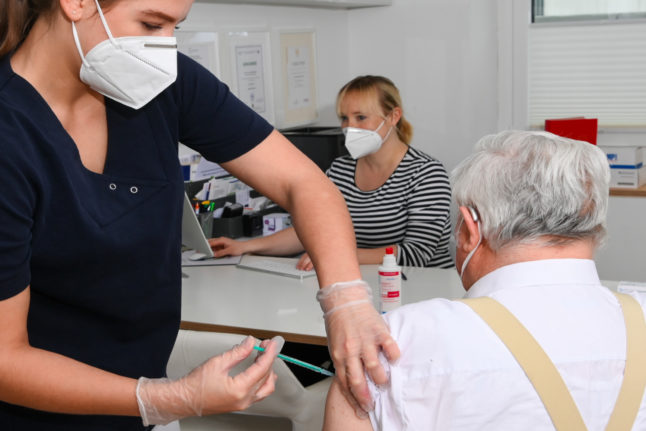GPs will be able to “order the specific Covid vaccine” they want to offer people, said the National Association of Statutory Health Insurance Physicians (KBV), according to the Rheinische Post.
“You state on the prescription which vaccine you need and how many doses,” the KBV reportedly said.
The federal government will provide family doctors with the choice of vaccines from BioNTech/Pfizer and AstraZeneca.
The order quantity per doctor is limited to 18 to 30 Pfizer doses and 10 to 50 AstraZeneca doses for the first week.
It is likely to come into force from April 26th.
The North Rhine Pharmacists’ Association welcomed the move, saying it would help make sure fewer doses are wasted.
“This could also prevent the vaccine from being left in the practice’s refrigerators,” said the head of the association, Thomas Preis. “We will advise doctors to order both vaccines if possible,” he added.
At the moment doctors are allocated a vaccine by the government without choice.
Germany’s vaccine rollout is picking up pace since doctor’s practices starting carrying out jabs.
Health Minister Jens Spahn said on Thursday that 50,000 medical practices had announced a need for vaccines for the coming week. Last week there were 35,000 GPs giving out shots, and this week 45,000.
The country administered a record 758,173 injections on Wednesday.
In total, about 18.5 percent of the population has received at least one jab.
READ ALSO:
- ‘The only way forward’: Should Germany introduce a Covid-19 immunity passport?
- ‘I finally might be able to go home’: What it’s like to be offered the Covid vaccine in Germany
What’s happening with the Johnson & Johnson vaccine?
The delivery of the single-dose Covid vaccine to the European Union was postponed this week due to the US investigating reports of rare blood clot cases after the Johnson & Johnson vaccine.
The US urged its health authorities to pause the rollout. However, US health experts believe it will be used again soon.
Germany is waiting for 10 million doses of the vaccine.
COMPARE: The different strategies in Europe used to vaccinate against Covid-19
Berlin vaccination centre closes for two weeks
In other vaccine news, the Berlin vaccination centre at Tempelhof is closing for two weeks from April 21st, reported the Tagesspiegel.
The centre has been using the AstraZeneca to inoculate patients. But now that this vaccine is only for use in the over-60s age group, authorities believe it is no longer worth giving it out in the centre.
During the break the centre is to be refurbished so that BioNTech/Pfizer vaccines can be administered in future.
Due to the properties of the vaccine, special cooling systems are required. In the future, AstraZeneca will only be used by GPs, the federal government said.
Vocabulary
To choose/select/pick out (something) – auswählen
Prescription – (das) Rezept
Order quantity – (die) Bestellmenge
Vaccination centre – (das) Impfzentrum
We’re aiming to help our readers improve their German by translating vocabulary from some of our news stories. Did you find this article useful? Let us know.



 Please whitelist us to continue reading.
Please whitelist us to continue reading.
Member comments